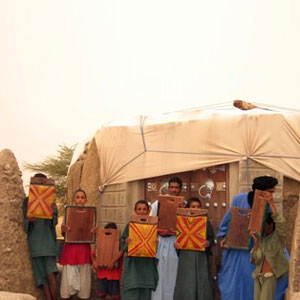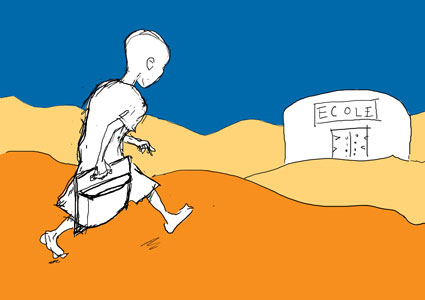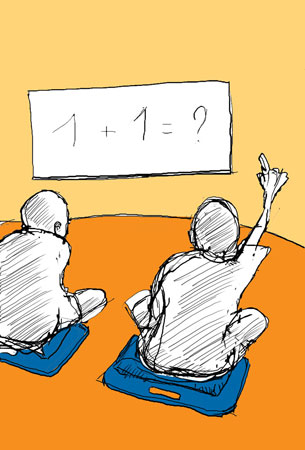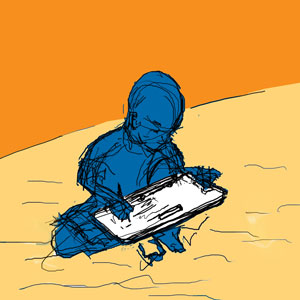More they don’t need: each pupil has a kind of bag made basically of a wooden board; the front side of the board serves as writing desk, the back side is the seat for the pupil; between seat and table is a pocket for pencils, notebooks, books. That’s all, except for the teacher – and school can begin.

Mobile Device for the Desert
A small board (45 x 35 cm) becomes seat, table and school bag in one = passport for education.
All nomad pupils need is a portable bag made basically of a wooden board: one side is the writing desk, the back side has a leather seat to sit on; between seat and table there is a pocket for pencils, notebooks, books. Nothing else needed — besides a teacher . . . and school can begin.

The “right for education” is part of the human rights bill.
Tuareg parents were concerned about the education of their children given new challenges in their every day life, since subsistence by transporting salt through the desert is no longer assured. In addition to the problem of learning different skills the Tuareg are facing the problem of discrimination, which results among others in no access to schooling.

First requirement was to create for the children (and more so for the world beyond) a signal approving that they, too, have a right for education. We wanted to give the children a personal belonging, their “own thing” which they keep for ever and take everywhere > a savings book.
The Tuareg resisted the colonial invasion at the end of the 19th century, but after bloody conflicts they had to sign treaties with Mali and Niger. Their territory was reorganized. Until nowadays they are divided between various modern states and are actually a nation without land. Their rights in Mali are limited; in the 1990s fights for independence would arise. The problem of desertification, the uselessness of transsaharan transport by camel and the population growth, all this presents a tough restriction of nomad conditions and has forced many of the Tuareg to settle down. But the right to basics such as water and education are not granted.
On the one hand the mobile device is the ticket to education but its philosophy requires on the other hand that this device be approved under practical points of view. In the desert, where wood is the most expensive material and where – in respect to nature – nothing should leave any impact behind, we were looking not for tables and chairs but for mobile solutions offering three topics: a desk to write on, a place to sit on and a container to carry the belongings – and all this at almost no weight. Together with the Tuareg – they are sitting and writing in the sand and they optimized their language, the Tamacheq, to be written in this passing medium – we designed the mobile device for the desert: either you sit on the sand writing on your desk, or you sit on your school bag comfortably, or you take it with you walking, your device carrying all the rest.
The design of the mobile device, i.e. the leather side, follows the local tradition– each one uniquely personalized and handmade by the mothers and their contribution free of charge. The mobile device makes no difference between boys and girls. In Mali only about half of all girls are enrolled in schooling.

We are looking forward to promote this mobile device elsewhere in the world, since it stands for three principles: children, education, equality, all well worth supporting. We would like to export the idea to other regions. And we are anxious to see other countries designs of the mobile device.